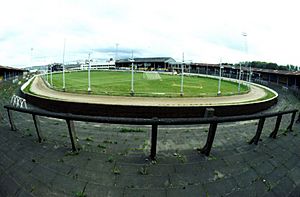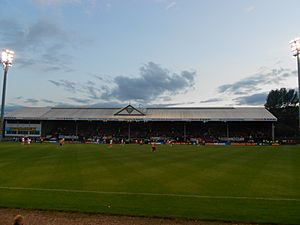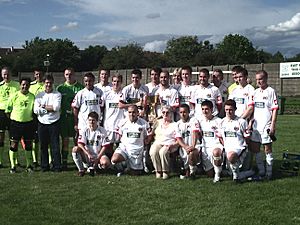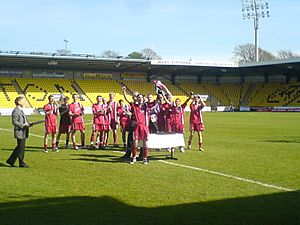Clyde F.C. facts for kids
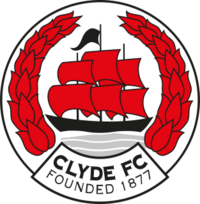 |
|||
| Full name | Clyde Football Club | ||
|---|---|---|---|
| Nickname(s) | The Bully Wee | ||
| Founded | 1877 | ||
| Ground | New Douglas Park, Hamilton | ||
| Capacity | 5,510 | ||
| Chairman | John Taylor | ||
| Manager | Darren Young | ||
| League | Scottish League Two | ||
| 2015–16 | Scottish League Two, 3rd | ||
|
|
|||
Clyde Football Club is a Scottish semi-professional football team. They play in Scottish League Two. The club started in 1877 near the River Clyde in Glasgow. Today, they play their home games at New Douglas Park in Hamilton, South Lanarkshire. Before 2022, they played at Broadwood Stadium for many years.
Clyde's biggest achievements include winning the Scottish Cup three times. They won in 1939, 1955, and 1958. They also reached the final three other times. The team has not played in Scotland's top football league since 1975.
Darren Young has been the club's manager since October 2024.
Contents
History
How Clyde Football Club Started (1877–1898)
Clyde Football Club began in 1877. They played their first games at Barrowfield Park in Glasgow, right by the River Clyde. Records from the SFA and old newspaper reports confirm this.
Barrowfield Park was in a busy area of Bridgeton. It was surrounded by factories and homes. The ground had a main stand, a clubhouse, and even tennis courts. A bicycle track went around the pitch. Today, this area has industrial buildings and some grassy spots. You might even be standing on a part of the old pitch!
When Clyde F.C. started, it was more like a private club. It was similar to a golf or bowling club today. The club's secretary, John Graham, was also a famous rower. This suggests the club offered more than just football.
Clyde's first recorded match was on September 17, 1877. They played against 3rd Lanark Volunteers at Barrowfield. 3rd Lanark won the game 3–1.
Clyde joined the Scottish Cup competition on September 29, 1877. One hundred and one other teams also entered. Third Lanark visited again and won 1–0. Later, other important competitions like the Glasgow Merchants Charity Cup and the Glasgow Cup were created.
In 1883, the Glasgow Football Association was formed. Clyde was one of the six clubs at the first meeting. Today, Clyde is one of only three founding clubs still playing. The others are Queen's Park and Rangers.
Clyde joined the Scottish Football League in 1891. Their first league game was on August 15, 1891, against Vale of Leven. Clyde won a huge 10–3! They finished the season in the middle of the league table. Barrowfield Park became too small for the growing crowds. Many people got in without paying. Other teams also complained about the facilities. So, in 1893, the club improved the pitch to help with drainage.
Clyde also won local cups in the late 1800s. They won the North Eastern Cup and Graham Cup four times each. These cups were for teams from the East End of Glasgow. However, Clyde had a very tough final season at Barrowfield. They finished last in Division 1 but managed to stay in the top league. The last game at Barrowfield was a friendly match against Sunderland on April 30, 1898. It ended in a 3–3 draw.
Moving to Shawfield and Early Success (1899–1919)
Clyde left Barrowfield in 1898. They bought land for a new stadium called Shawfield. This new ground was across the river, between Oatlands and Rutherglen. The club raised money by selling shares to become "The Clyde Football Club Limited." The new stadium had a grandstand for 1500 people and banks around the pitch for more fans.
Celtic played the first game at Shawfield on August 27, 1898. About 10,000 fans watched a 0–0 draw. In the 1899–1900 season, Clyde finished last and was moved down a division.
They became Division Two champions in 1904–05. They were also runners-up in 1903–04 and 1905–06. Promotion to the top league didn't happen automatically until 1921. The years leading up to World War I were very successful for Clyde.
From 1908 to 1913, Clyde was one of the top teams in Division One. They reached the Scottish Cup final in 1910 and 1912. They finished third in the league in 1908–09 and 1911–12. They also reached more Scottish Cup semi-finals.
The 1910 Scottish Cup final was a tough loss. Clyde led Dundee 2–0 with only minutes left. But Dundee scored two late goals, including one in the last minute, to draw 2–2. The replay was 0–0 after extra time. In the third match, Clyde scored first, but Dundee came back to win the cup. In the 1912 final, Clyde lost 2–0 to Celtic.
Clyde players started playing for their country in March 1909. William Walker played for Scotland against Jack Kirwan of Ireland. Scotland won 5–0. Clyde won the Glasgow Charity Cup in 1910 and the Glasgow Cup in 1914. These were very important competitions before European football began.
In September 1914, a fire destroyed the grandstand at Shawfield. This meant much of the club's early history was lost. When World War I started, many players joined the army. Some, like C. Clunas and T. Cranston, never returned. This made it hard for teams like Clyde to have enough players.
Winning the Scottish Cup (1920–1945)
After the war, the Scottish League continued. In 1921–22, automatic promotion and relegation were introduced. This meant teams could move up or down divisions based on their performance.
Clyde was moved down a division in 1923–24. They spent two seasons in the lower league before getting promoted again in 1925–26. From 1926 to 1939, Clyde stayed in Division One. They usually finished in the middle of the table. During this time, Danny Blair was a well-known player for Scotland. Billy Boyd was a top goalscorer for Clyde.
The club almost went out of business in 1930. Greyhound racing was popular, and many clubs rented out their stadiums for dog races to earn money. Clyde's chairman, John McMahon, wanted to do this at Shawfield. After some disagreements, the Shawfield Greyhound Racing Company Ltd started racing in 1932. A few years later, they bought the stadium from Clyde.
Clyde had an amazing run to the 1939 Scottish Cup final. They only let in one goal on their way to the final! They beat St Johnstone, Dundee, Third Lanark, and Hibernian. The only goal they conceded was against Rangers. In that game, Willie Martin scored all four goals in a 4–1 win for Clyde at Ibrox.
On April 22, 1939, Clyde faced Motherwell in the final at Hampden. About 94,000 fans watched. Clyde scored first with a goal from Wallace. Martin then doubled the lead. Later, Noble and Martin scored again, sealing a big 4–0 win. This was Clyde's first ever Scottish Cup triumph!
When World War II started in 1939, the Scottish League was stopped. Players' contracts were cancelled. But unofficial competitions soon began, split into East and West regions. Clyde played in the Southern League. They finished second behind Rangers in 1940–41.
After the war, the Scottish League Cup started in 1946. John McMahon, who was chairman of Clyde and the SFL, donated the trophy that is still given to the winners today.
More Cup Wins and Changes (1946–1969)
In 1947, Clyde went on a long trip to South Africa. They played 20 matches, winning 16, drawing 2, and losing only 2. In 1953, famous player Stanley Matthews even played for Clyde in a special match against Everton in Belfast.
Leslie Johnston, a Scotland international player, broke the Scottish transfer record twice while playing for Clyde in the 1940s.
Clyde reached their fourth Scottish Cup final in 1948–49. They lost 4–1 to Rangers in front of 108,000 fans at Hampden.
The 1950s saw Clyde move between divisions. They were moved down in 1950–51 but came back as Division B champions in 1951–52. They did this again in 1955–56 and 1956–57. Each time, they returned to the top division and played well. Floodlights were added to Shawfield in March 1954.
Clyde had great success in cup competitions in the 1950s. They won the Scottish Cup in 1954–55 and 1957–58. They also reached the semi-finals of the Scottish Cup and Scottish League Cup several times.
In the 1955 Scottish Cup final, Clyde played Celtic. The game was televised live for the first time. Celtic was expected to win easily. With three minutes left, Celtic led 1–0. But Robertson scored directly from a corner kick to make it 1–1. In the replay, Tommy Ring scored the only goal, and Clyde won the cup!
On April 26, 1958, Clyde faced a strong Hibernian team in the Scottish Cup final. The game was at Hampden, with 94,000 fans watching. A goal from Coyle gave Clyde a 1–0 win. This was their second Scottish Cup in four seasons and third overall. Three Clyde players, Haddock, Robertson, and Coyle, were chosen for the 1958 FIFA World Cup Scotland squad.
Clyde joined the Friendship Cup in 1960. This was a competition between clubs from England, France, and Scotland. Clyde played against RC Lens from France and beat them 4–0 away and 2–1 at Shawfield.
In the early 1960s, Clyde often moved between divisions. They were moved down in 1960–61 and 1962–63. But they were promoted right back up in 1961–62 (as champions) and 1963–64.
In the 1966–67 season, Clyde had their best league finish in 45 years, coming third. They also reached another Scottish Cup semi-final. Even though they were a part-time team, they finished behind only the Old Firm clubs (Celtic and Rangers). Clyde could not play in European competitions because of a rule that only one team per city could enter. Rangers already had that spot.
As the 1960s ended, Clyde was playing well in the top division. However, fewer fans were coming to games. Many homes in areas like Bridgeton and Rutherglen were being torn down. People moved to other parts of the city, and many never returned to support the team.
Challenges and New Homes (1970–1993)
The 1970s started with Clyde facing the risk of being moved down a division. There were talks about merging with other clubs like Hamilton Academical and Dumbarton, but these plans didn't work out.
After being moved down in 1971–72, many famous players left Clyde. But the team bounced back and won promotion as Division Two champions in 1972–73. They spent two more years in the top division before being moved down again in 1974–75. This was their last time in the top league so far. The Premier Division was created in 1975–76, and Clyde was not high enough in the league to join it. They found themselves in the second tier, now called the First Division.
Clyde then became known for finding and developing talented young players. They would sell these players to bigger clubs. Future Scotland international players like Steve Archibald, Ian Ferguson, and Pat Nevin all started at Shawfield.
The club faced problems on and off the pitch. After finishing last in the First Division in 1975–76, they ended up in the Second Division, which was the third tier. In just ten years, Clyde went from being one of Scotland's best teams to almost the very bottom of the league.
Celtic legend Billy McNeill became manager for a short time in 1977. Then, Craig Brown took over and led the team to win the Second Division in 1977–78.
Shawfield Stadium was getting old and needed repairs. By the late 1970s, the stadium was owned by the Greyhound Racing Association (GRA). They wanted to sell the land for new buildings. Clyde was told to leave Shawfield by 1986. The last game at Shawfield was on April 28, 1986, where Clyde won 4–2 against Alloa Athletic.
The club had to share grounds with other teams. They spent five difficult seasons at Firhill, home of Partick Thistle. Then, they shared Douglas Park with Hamilton Academical for two and a half seasons. During these years, Clyde fans started calling themselves the 'Gypsy Army' because the club had no permanent home.
On the field, Clyde continued to move between divisions. They were moved down from the First Division in 1990–91. But they won promotion again as Second Division champions in 1992–93. However, they were moved down immediately in 1993–94. This showed their pattern of moving up and down the leagues.
Broadwood Stadium and Recent Years (1994–2022)
The Cumbernauld Development Corporation wanted a sports stadium and a professional football team in Cumbernauld. This new town had a large population and seemed like a good place for new fans. A new stadium called Broadwood was built. It was part of a bigger plan with businesses, homes, and leisure facilities.
Clyde moved into Broadwood in the middle of the 1994–95 season. Their former landlords, Hamilton Academical, were the first team they played there on February 5, 1994. A crowd of 6,000 watched Clyde lose 2–0.
In 1998, Clyde almost dropped to the lowest level of senior football. The new chairman, Billy Carmichael, made changes. Ronnie MacDonald became manager and brought in many players from lower leagues. Within two seasons, Clyde was promoted. Allan Maitland then led them to promotion to the Scottish First Division in 1999.
The 2003–04 season was exciting. Clyde was at the top of the league and looked like they might join the SPL. But Broadwood Stadium didn't meet SPL rules. Also, Clyde was in serious financial trouble. The SPL said Clyde could join if a fourth stand was built. However, the council stopped work when they learned about Clyde's money problems. Clyde missed out on promotion after drawing with Ayr United and losing to Inverness Caledonian Thistle.
The Clyde Supporters' Trust was formed during this time. Fans were worried about the club's finances. The Trust and other investors took control of the club. By June 2005, Clyde was mostly debt-free.
In 2005–06, Clyde had a memorable Scottish Cup game against Celtic at Broadwood. Celtic was a huge favourite, but Clyde won 2–1! Eddie Malone and Craig Bryson scored for Clyde. Clyde also reached the 2006 Challenge Cup Final, their first final in 48 years. They lost on penalties after a 1–1 draw.
Colin Hendry, a former Scotland captain, became manager in 2007. He resigned in January 2008. John "Bomber" Brown took over. Clyde avoided being moved down after a thrilling play-off victory.
However, the next season, Clyde finished last in the First Division and was moved down. Financial problems returned. In June 2009, Clyde ended the contracts of all their first-team players to try and avoid going out of business. The team was rebuilt with a much smaller budget.
On April 17, 2010, Willie Sawyers scored the fastest goal in Clyde's history, after only eight seconds! Despite this, the club was moved down for a second season in a row, to the Third Division. They finished last in the entire Scottish league system in 2011.
In 2013, Clyde's owners voted to move to East Kilbride, but this plan was later dropped. The 2013–14 season saw a big improvement. Clyde reached the play-offs for Scottish League One but lost in the semi-finals.
In October 2014, Clyde was officially debt-free. They had been carrying a large debt from their failed promotion bid in 2003–04. Barry Ferguson, a former Rangers and Scotland player, became player-manager in June 2014. He retired as a player at the end of that season.
After nine years in the bottom league, Danny Lennon led Clyde to promotion to Scottish League One at the end of the 2018–19 season. They beat Annan Athletic 2–1 in the play-off final.
In April 2022, Clyde announced they would leave Broadwood at the end of the 2021–22 season. This ended their 28-year stay in Cumbernauld. They now share New Douglas Park with Hamilton Academical. The club hopes to move back to Glasgow in the future. Clyde's last game at Broadwood was a loss to Airdrieonians on April 23, 2022.
Grounds
Clyde has played at five different home grounds since 1877.
Barrowfield Park
Clyde's first home was Barrowfield Park. It was located on the banks of the River Clyde, between the Glasgow areas of Bridgeton and Dalmarnock.
Shawfield Stadium
By 1898, Barrowfield was too small for the growing crowds. So, the club moved across the river to build a new stadium called Shawfield Stadium.
The first match at Shawfield against Celtic drew 10,000 fans. In 1908, a game against Rangers brought in 52,000 people. This is still Clyde's record home attendance. Due to money problems, the club sold the stadium in 1935 to the Greyhound Racing Association. This arrangement worked for over 50 years. But in 1986, the GRA decided to redevelop the stadium and told Clyde to leave.
Broadwood Stadium
In 1990, Clyde agreed to move to a new stadium in Cumbernauld. This new town was one of the largest in Scotland without a senior football team. The new all-seater Broadwood Stadium was ready in 1994.
Clyde moved into Broadwood during the 1994–95 season. Broadwood has hosted Scotland U21 matches and several Scottish Challenge Cup finals. Other teams, like Airdrieonians and Rangers reserves, also used Broadwood.
In 2010, Clyde told their landlords they wanted to leave Broadwood. They looked into moving to East Kilbride or back to Rutherglen.
In April 2022, the club announced they would leave Broadwood at the end of the 2021–22 season. This ended their 28 years in Cumbernauld. They now share New Douglas Park with Hamilton Academical. The club hopes to find a new home back in Glasgow soon.
Sharing Grounds with Other Teams
After the Great War started, a fire destroyed the grandstand at Shawfield in September 1914. Clyde had to play their home games elsewhere for a while. Celtic offered their stadium, Celtic Park, for Clyde's home matches.
Later, in 1929, Celtic Park was also damaged. Celtic then played their remaining games at nearby Shawfield, returning the favour.
On March 1, 1958, Clyde played Celtic in the Scottish Cup. The game was moved from Shawfield to Celtic Park due to safety worries. But Clyde still had "home advantage" because tickets were reserved for Clyde fans. Clyde won 2–0 with goals from Ring and Currie.
After leaving Shawfield in 1986, Clyde shared Firhill with Partick Thistle for five seasons. Then, they shared Douglas Park with Hamilton Accies for three more seasons until Broadwood was ready.
In 2012, Clyde had to use Recreation Park in Alloa for their first home game of the season. This was because a new artificial pitch at Broadwood wasn't finished in time. They also played their second home game there. The new pitch was ready for their next home match.
Supporters
Clyde Football Club is completely owned by its supporters.
Clyde fans have a strong rivalry with Partick Thistle. Both clubs are smaller than Rangers and Celtic. However, because Partick Thistle has been more successful and Clyde has been in lower leagues, these derby games are now rare. They did play in the same league in the 2020–21 season.
Because Clyde spent many years without a permanent home, their fans started calling themselves the Gypsy Army. This name came from rival fans using "gypsies" as an insult, but Clyde supporters proudly adopted it.
The Clyde Supporters' Trust was formed in 2003–04. Fans realized the club was in serious financial trouble. The Trust helped save the club and keep it owned by supporters. The Trust has helped pay for new players and keep important players at the club.
Clyde supporters also have their own football teams. Bully Wee United is the official supporters' team. They play in the IFA League on Saturday mornings, often against other clubs' supporters' teams. Only Clyde supporters can play for Bully Wee United. Another supporters' team, Broadwood Clyde, was formed in 1994. They have won several amateur league titles and cups.
The Clyde View Programme
The Clyde View is Clyde's official matchday programme. It has won many awards. It was named Scottish Programme of the Year multiple times between 1995 and 2009. It also won the Scottish Divisional Programme of the Year Award for many seasons. It has also been ranked highly in UK-wide programme awards.
Nickname
The club's nickname is "The Bully Wee." Its exact origin is not certain, but there are three main ideas.
One idea is that the club's players and supporters came from Bridgeton, Glasgow, a working-class area. People from Bridgeton had a reputation as "wee bullies," and this might have led to the nickname.
Another story says that around 1900, some French supporters visited Barrowfield. After a disputed goal, they supposedly said "But il'y, oui?" which means "Their goal, yes?" Supporters heard this as "Bully Wee," and the name stuck.
The most likely theory, accepted by the club, links the name to an old Victorian saying. "Bully" used to mean "first-rate" or "high standard." So, Clyde, being a smaller club, might have been called "Bully Wee Clyde," meaning "excellent little Clyde." The first two words then became the nickname.
Clyde's supporters are also known as the "Gypsy Army." This name came about because the club spent many years without a permanent home. Rival fans used "gypsies" as a negative term, but Clyde supporters took it on as a badge of honour.
Rivalries
Clyde has historical rivalries with other football teams in and around Glasgow. These include Celtic, Rangers, Partick Thistle, Queen's Park, and the now-closed Third Lanark.
For most of the 20th century, these six clubs were among the top teams in Scotland. They often played each other many times a season in national tournaments and local competitions like the Glasgow Cup and Glasgow Charity Cup.
A very early rival was Thistle FC, also known as Glasgow or Bridgeton Thistle. They played near Clyde's first home, Barrowfield Park. Thistle FC stopped playing in 1894 after a friendly match against Clyde.
The rivalry between Clyde and Partick Thistle used to be very strong. They were seen as Glasgow's two smaller clubs compared to the Old Firm. The rivalry grew when Thistle became Clyde's landlords at Firhill for five years in the 1980s. Neither set of fans fully liked this ground-sharing. Players who moved between the clubs sometimes faced strong reactions from fans. Because Partick Thistle has been in higher leagues recently, matches between the two clubs have become less common. However, they were in the same division again in 2020.
In the 2010s, Queen's Park became a natural rival for Clyde. Both clubs were often in the bottom league for most of that decade. From 2010 to 2016, Queen's Park had a very strong record against Clyde, winning 17 out of 26 matches.
Since moving to Cumbernauld in 1994, Clyde is now considered a North Lanarkshire club. This means games against teams like Airdrieonians, Albion Rovers, Motherwell, or Hamilton Academical can be called a Lanarkshire derby.
Managers
Clyde Football Club has had 35 permanent managers in its history.
- William Aitken (1900–1905)
- Walter Jack (1905–1909)
- Alec Maley (1909–1912)
- John James Commins (1912–1922)
- Frank Thompson (1922–1935)
- Russell Moreland (1935–1937)
- Paddy Travers (1937–1956)
- Johnny Haddow (1956–1962)
- John Prentice (1962–1966)
- Davie White (1966–1967)
- Archie Wright (1967)
- Archie Robertson (1968–1973)
- Stan Anderson (1973–1977)
- Billy McNeill (1977)
- Craig Brown (1977–1986)
- John Clark (1986–1992)
- Alex Smith (1992–1996)
- Gardner Speirs (1996–1998)
- Ronnie McDonald (1998)
- Allan Maitland (1998–2002)
- Alan Kernaghan (2002–2004)
- Billy Reid (2004–2005)
- Graham Roberts (2005–2006)
- Joe Miller (2006–2007)
- Colin Hendry (2007–2008)
- John Brown (2008–2009)
- John McCormack (2009–2010)
- Stuart Millar (2010–2011)
- Jim Duffy (2011–2014)
- Barry Ferguson (2014–2017)
- Jim Chapman (2017)
- Danny Lennon (2017–2022)
- Jim Duffy (2022–2023)
- Brian McLean (2023)
- Ian McCall (2023–2024)
- Darren Young (2024–)
First-team squad
|
|
Club Officials
Board
- Chairman: John Taylor
- Directors: John Alexander, David Hunter, Graeme Kelly, Gordon Nisbet, Gordon Thomson
- Finance director: Harry Paterson
- Governance director: Bryan Macpherson
- Media and communications director: Sean Hart
- Associate directors: Andrew Clark, Steven Powell
Coaching staff
- Manager: Darren Young
- Assistant manager: Neil Scally
- Goalkeeping coach: James Evans
- Physiotherapist: Alistair Gray
- Sports scientist: Owen Murphy
Youth Teams and Development
Clyde has a history of developing young football talent. The club used to have youth teams at many age levels, from under-11 to under-20.
In May 2008, Clyde's reserve team won the Reserve League Cup for the first time. They beat Livingston 4–1, with Dave McKay scoring all four goals.
The club's youth academy faced funding cuts in 2015. This meant they had to stop running most of their youth teams, keeping only the under-20 side. This team helps young players move up to the first team.
Clyde's under-17 team reached the SFL Youth Cup final in 2004, but lost on penalties. In 2014, the under-19 team finished second in the first SPFL under-19 league, behind Celtic.
In 2003, the under-19 team traveled to the Netherlands for a special youth football program. They played against Dutch youth teams, winning two out of three matches.
Since the 2018–19 season, Clyde has a program called Project Braver. This project helps young players develop their football skills and gives them chances for further education or apprenticeships.
Many players who came through Clyde's youth system have gone on to play for the first team. Some, like Pat Nevin, Steve Archibald, and Ian Ferguson, even became Scottish internationals.
Hall of Fame
|
Clyde started its official Hall of Fame in 2011. Five people were the first to be included. More people and the successful 1966–67 team have been added since then.
Honours
League Titles
|
Cup Wins
|
Other Trophies
- Glasgow Cup (5): 1914–15, 1925–26, 1946–47, 1951–52, 1958–59
- Glasgow Merchants Charity Cup1 (4): 1909–10, 1951–52, 1957–58, 1960–61
- Southern League
- Runners-up: 1940–41
- Summer Cup
- Runners-up: 1943–44
- West of Scotland League / Shield (2): 1904–05, 1906–07
- Glasgow North Eastern Cup (4): 1890–91, 1892–93, 1893–94, 1894–95
- Graham Charity Cup (4): 1888–89, 1889–90, 1890–91
- Paisley Charity Cup (2): 1938–39, 1939–40
- Friendship Cup: 1960–61 (joint-winners)
- 1Clyde shared the trophy with Third Lanark in 1952 and with Celtic in 1961.
Friendly Trophies
- Keyline Challenge Cup (3): 1999, 2000, 2001
- Tommy McGrane Cup: 2006
- Broadwood Cup: 2020
Reserve Team Honours
- Scottish Reserve League West: 1988
- Combined Reserve League: 1962
- Scottish Second XI Cup: 1914, 1915, 1942
- Reserve League Cup: 2008
- Glasgow Second XI Cup: 1898
- North Eastern Second XI Cup: 1892
Youth Team Honours
- Rangers Youth Invitational Tournament (under 13s): 2008
- Helensburgh Bi-Centennial Tournament (under 13s): 2002
- Kildrum United Football Festival (under 13s): 2007
- CKSSDA 11-a-side Tournament (under 12s): 2008
Records
- Record home attendance: 52,000 vs Rangers (November 28, 1908) at Shawfield Stadium. At Broadwood Stadium, the record is 8,000 vs Celtic (January 8, 2006).
- Record win: 11–1 vs Cowdenbeath (October 6, 1951), and 10–0 vs Stranraer (August 14, 1957).
- Record European win: 4–0 vs RC Lens (August 7, 1960).
- Record loss: 11–0 vs Dumbarton (November 22, 1897).
- Most capped player: Tommy Ring: 12 times for Scotland.
- Most international goals: Tommy Ring: 2 for Scotland, Archie Robertson: 2 for Scotland.
- Most goals in one season: Billy McPhail: 36 goals in 1951–52, Basil Keogh: 36 goals in 1956–57.
- Youngest player: Connor Stevenson, who was 16 years and 245 days old (against Queen of the South on April 15, 2009).
Top League Appearances
(League games only, includes substitute appearances):
| Name | Seasons | Appearances | |
|---|---|---|---|
| 1 | Brian Ahern | 1971–1981 1983–1987 |
420 |
| 2 | Tommy McCulloch | 1957–1972 | 378 |
| 3 | Ross McFarlane | 1983–1995 | 376 |
| 4 | Harry Haddock | 1949–1963 | 365 |
| 5 | John McHugh | 1961–1975 | 358 |
| 6 | Keith Knox | 1987–1997 | 322 |
| 7 | Eddie Anderson | 1969–1980 | 296 |
| 8 | Archie Robertson | 1949–1961 | 293 |
| 9 | Tommy Ring | 1950–1960 | 280 |
| 10 | Jim Burns | 1967–1976 | 270 |
Top League Goalscorers
(League games only, includes substitute appearances):
| Name | Years | Goals | |
|---|---|---|---|
| 1 | Tommy Ring | 1950–1960 | 124 |
| 2 | Archie Robertson | 1949–1961 | 121 |
| 3 | Billy Boyd | 1930–1933 | 91 |
| 4 | Billy McPhail | 1947–1956 | 90 |
| 5 | Neil Hood | 1975–1980 1981–82 |
71 |
| 6 | Harry Hood | 1962–1965 1966–1969 |
70 |
| 7 | John Buchanan | 1949–1955 | 69 |
| 8 | Danny Masterton | 1980–1984 | 67 |
| 9 | Brian Ahern | 1971–1981 1983–1987 |
63 |
| 10 | Pat Keogh | 1998–2004 | 56 |
Noted Players
This is a list of players who played for their national teams while at Clyde.
 Ireland
Ireland
- Frank Thompson (2 games)
- Jack Kirwan (1 game)
- Jack McGrillen (1 game)
- Ned Weir (1 game)
- Albie Murphy (1 game)
- Ned Weir (3 games)
- Alec Linwood (1 game/1 goal)
- Archie Robertson (5 games/2 goals)
- Billy Boyd (2 games/1 goal)
- Danny Blair (7 games)
- George Herd (5 games/1 goal)
- Harry Hood (3 games)
- Harry Haddock (6 games)
- Hugh Long (1 game)
- Jimmy Campbell (1 game)
- John Brown (1 game)
- Leslie Johnston (2 games/1 goal)
- Tommy Ring (12 games/2 goals)
- William Walker (2 games)
See also
 In Spanish: Clyde Football Club para niños
In Spanish: Clyde Football Club para niños
 | Toni Morrison |
 | Barack Obama |
 | Martin Luther King Jr. |
 | Ralph Bunche |


